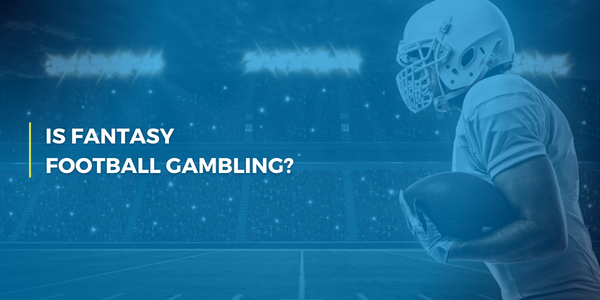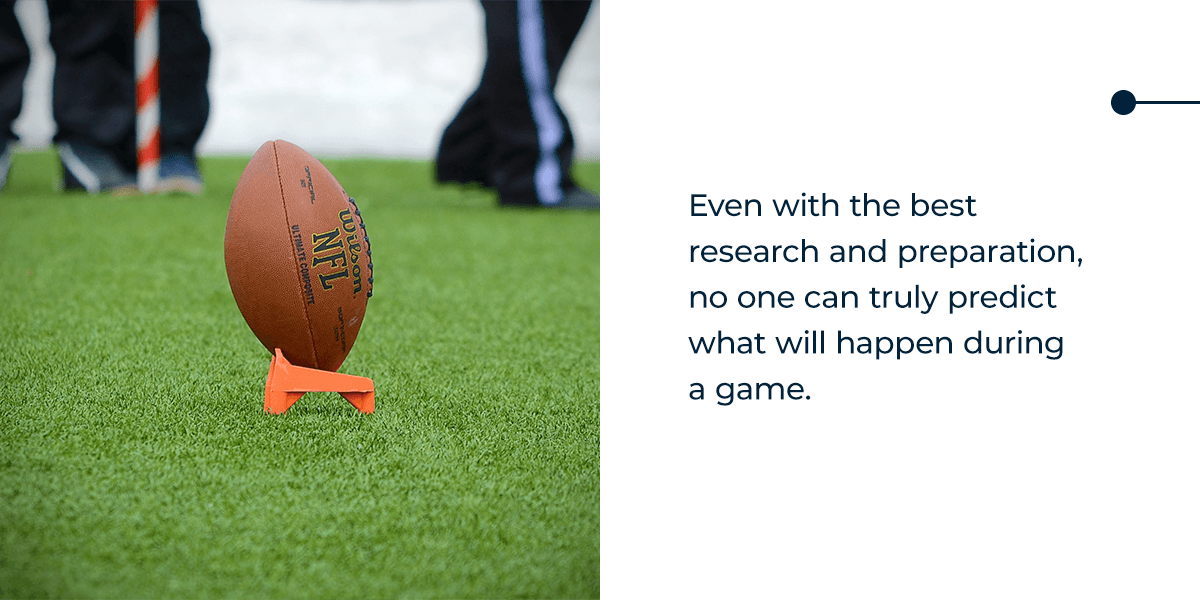- Aug 11
- Addiction

In the eyes of lawmakers, fantasy football is not considered gambling. Many people believe it is a game of skill rather than luck. As a result, it can be easy to justify fantasy football gaming as a healthy outlet or harmless activity. But what might start as a fun game played between friends can quickly become problematic for someone who has previously struggled with gambling addiction.
Keep reading to discover how fantasy football compares to sports betting and how it can harm someone in recovery.
What Is Fantasy Football?
Fantasy football is a game that allows you to manage your own NFL team. Competing against friends, you start by drafting a team of real NFL players and score points based on their performance each week. During the games, you’ll watch as they run, pass, tackle, catch, and score touchdowns, which are worth fantasy points. At the end of the week, you’ll be matched up with another team in your league, add up your team’s points, and whoever has the most is declared the winner.
Fantasy Sports vs. Sports Betting
The primary difference between fantasy sports and sports betting is that sports betting involves putting money down on specific outcomes. In contrast, fantasy football consists in picking a team of players and earning points based on their performance. Sports bets are placed through a sportsbook, which provides fixed odds and payout amounts.
Additionally, some people believe fantasy sports are considered games of skill since you’re unlikely to win money if you don’t research, strategize and plan your lineup accordingly. In sports betting, anyone can make a bet and win without prior knowledge.
There are similarities between fantasy sports and sports betting. For instance, they both aim to predict a sports contest outcome. Even if the route to victory is different, both activities can lead to wagering money on the result of a game. However, lawmakers do not view fantasy sports and sports betting as similar approaches. The Unlawful Internet Gambling Enforcement Act (UIGEA) explains that fantasy sports are games of skill backed by statistical analysis rather than luck, like sports betting.
Still, participating in fantasy sports can be problematic for people who struggle with sports betting addiction. While these games may seem like harmless fun, it is common for people who participate in fantasy football to also place sports bets on relevant matches.
Why Fantasy Football Gambling Can Be Detrimental if You’re in Recovery
If you’ve had a gambling addiction, you might find it easy to fall down the rabbit hole of fantasy football — obsessing over each game and player and perhaps even placing large bets on the outcomes. Here’s why a fantasy football habit can be problematic for someone in recovery:
1. The Game Only Appears to Be Skills-Based
While people might reason that fantasy football is not a form of gambling because it takes skill, that’s not entirely true. There are a few reasons why fantasy sports games are based on luck. First, they depend on how well players perform in their games. Even with the best research and preparation, no one can truly predict what will happen during a game.

Additionally, player performances are dependent on random variables, such as a blocked field goal attempt or a player being in the right place for a 50-yard pass before time expires.
Other factors that can influence a game include:
- Coaching and officiating decisions
- Weather
- Injuries
- Game strategies and flow
It’s easy for people to become addicted to these games, as they believe their outcomes result from skill. However, no amount of knowledge or strategy can overcome these random variables.
2. There Is Often Insider Training Involved
It’s essential that you know certain variables are involved in teams winning or losing, just like how bookmakers create the odds in sports betting.
Many fantasy football payouts are based on pools of participants. Those who gamble on less frequently chosen players often stand to win more than those who bet on popular stars, revealing the influence of insider trading. Many employees of fantasy football organizers know players that are chosen more and frequently win larger amounts of money on games.
3. It’s Easy to Fall Down the Rabbit Hole
Fantasy football can be addictive and have consequences on your mental health. There are highs and lows to the game, and with each week of new outcomes, you can become so addicted to fantasy football that it becomes a primary focus of your life. It’s easy to obsess over how many points the game can score for you, even if it doesn’t result in a payout.
This line of thinking can spiral into wagering money and getting lost in each game. You might start believing that the more research you do, the higher your points will be, even when game outcomes often come down to chance. Similar to gambling, the compulsive and addictive nature of fantasy football has also been shown to impact mental health. One study reported mild low moods or greater in 44% of people who frequently played the game.
What to Do Instead
While fantasy football might seem harmless at first, there are other ways to occupy your time to avoid relapsing into gambling addiction. Alternatives include:
- Exercise: School and work can take up a lot of time during the week, and when you add fantasy football on the weekends, it can be tough to exercise. As an alternative to fantasy football, hit the gym on the weekends or play a casual game of touch football with friends at a park.
- Go to an NFL game: Experiencing a real NFL game means stepping away from your phone or laptop, preventing you from checking on your fantasy team. So get out there and have fun — after all, seeing the games up close will be much more rewarding than playing a fantasy game.
- Spend time with friends: Keeping an active social life can provide many mental health benefits, making it an excellent distraction to fantasy football. You might join a real sports league, strike up a casual game with friends or simply enjoy each other’s company on the weekends rather than getting sucked into a football game.
- Talk to a mental health professional: If your fantasy football addiction is beginning to consume most of your time and impact your health, you might benefit from speaking to a mental health counselor. In therapy, you can learn healthy coping mechanisms for stress and other underlying causes of addiction to help you recover.
Start Your Gambling Addiction Recovery at Gateway Foundation
A fantasy sports addiction can seriously impact your life, including your financial, social, and mental health. If you or someone you know is struggling, Gateway Foundation can help. Our gambling addiction treatment methods include 12-step programs, behavioral therapies, and dual diagnosis care to help you learn the underlying causes of your addiction and adopt healthy coping skills.
At Gateway, we offer a safe, comfortable, and affordable environment to help patients recover from gambling addiction. To learn more about our treatment programs, contact us today.



